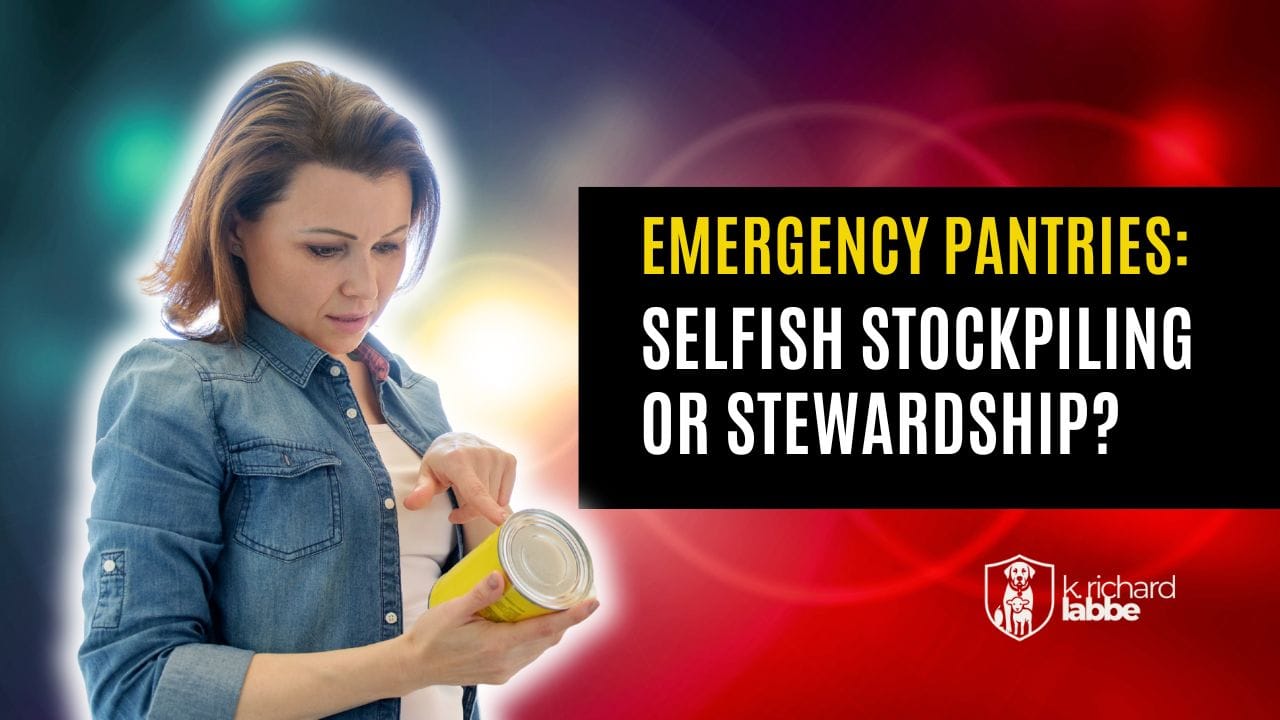Emergency Pantries: Selfish Stockpiling or Stewardship?
When you build a pantry, you’re not building a bunker. You’re building a buffer—a margin of grace for the people you love.

“Therefore do not worry about tomorrow, for tomorrow will worry about itself. Each day has enough trouble of its own.”
—Matthew 6:34 (NIV)
For some of us, the thought of building a preparedness pantry raises questions. Honest ones. Faithful ones.
Does this mean I’m not trusting God to provide?
Am I storing up treasures on earth instead of in heaven?
Is this just a more socially acceptable form of fear?
These are the kinds of questions believers should ask—not out of guilt, but out of a desire to walk in wisdom and faith.
And here’s the truth: there’s a difference between stockpiling out of panic and preparing out of love.
Not Fearful Hoarding, But Faithful Stewardship
Scripture warns us against greed and self-protection that shuts others out. The rich fool in Luke 12 hoarded his abundance and said to himself, “Eat, drink, and be merry,” not realizing his life would be required of him that very night. He was not faulted for his full barns—but for a full heart that left no room for God or neighbor.
Contrast that with Joseph in Genesis 41. In obedience to God’s revealed wisdom, he stored up grain during seven good years—not as an act of selfish security, but so that Egypt and the surrounding nations would be fed during famine. His preparation became provision. His faith expressed itself in foresight.
Biblical preparedness is not about clenching our fists. It’s about opening our hands.
Jesus’ Words About Worry
When Jesus told us not to worry about tomorrow, He wasn’t telling us to ignore it. He was addressing anxious preoccupation, not wise responsibility.
The same Jesus who said, “Don’t worry,” also praised the wise builder who laid a foundation (Matthew 7), the watchful servants who kept their lamps lit (Luke 12), and the prudent virgins who brought oil in advance (Matthew 25). These are not images of apathy or panic, but of calm, forward-looking faith.
Preparedness is not the opposite of trust. It’s one way trust gets lived out—in humble planning and calm, loving provision.
Love Looks Like Bread on the Table
In 1 Timothy 5:8, Paul writes that anyone who does not provide for their relatives, especially their own household, has denied the faith. That’s strong language—but it reminds us that spiritual maturity isn’t just about doctrine. It’s also about doing the dishes, tending the garden, and making sure the people under our roof have what they need.
When you build a pantry, you’re not building a bunker. You’re building a buffer—a margin of grace for the people you love.
And more than that: you’re positioning yourself to be ready for others.
That extra can of soup? It may end up on a neighbor’s table.
That spare water filter? It might bless someone who didn’t see the storm coming.
That flashlight or first aid kit? It could be the reason someone else feels safe.
Preparedness, in a gospel-shaped life, becomes hospitality.
A Quiet Act of Trust
So yes—store wisely. But don’t store fear.
Build margin—but don’t build pride.
And prepare not as those who fear the future, but as those who follow the One who holds it.
Our Lord is not honored by worry, but He is honored by watchfulness.
Our Savior told us not to be anxious, but He also fed the hungry.
Let your pantry be one more small way your faith takes on flesh.
“The prudent see danger and take refuge,
but the simple keep going and pay the penalty.”
—Proverbs 22:3
Want to Build a Pantry Without Fear?
If you’d like a gentle, practical guide to building your first 30-day pantry—without panic or prepping out—I’ve written one just for you:
👉 Read: 30 Days Ready – How to Build a Real-Life Emergency Pantry
Let’s be people who live wisely, care generously, and walk into the unknown with calm, gospel-shaped courage.
